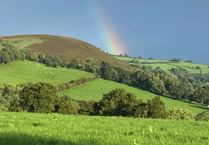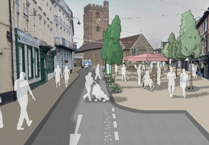THE great niece of a soldier from Breconshire killed in the Battle of Passchendaele, the bloodiest conflict of the First World War, has been to see his grave.
William Parry, of Sennybridge died on Pilckem Ridge in the Third Battle of Ypres on July 31, 1917 alongside the Welsh poet Hedd Wyn.
Gwyneth Evans, who lives in Brecon, recently visited her great uncle’s grave in the New Irish Farm Cemetery, north east of Ypres (now Ieper) in Belgium to mark the centenary of his death.
The family has remembered William every year and Gwyneth has continued the tradition of placing flowers on a memorial stone, at Rhydybriw Church in Sennybridge which is now, ironically, accessed through the Army camp.
But to mark the 100th anniversary Gwyneth visited her great uncle’s grave for the first time when she travelled to Belgium at the beginning of this month.
She said: “I had always resolved I would go the grave to mark the 100th anniversary.
“It was emotional as I’ve always looked at his name on the plaque in Rhydybriw Church but when I saw the grave, and looked at it, I felt very emotional.
“I had taken with me some soil, in a little bag, from Sennybridge, from Rhydybriw churchyard, and some Welsh yellow poppy seeds and some water as it was so dry out there.
“I put all of this in front of the grave.”
Passchendaele was a fierce battle in which soldiers, weighed down with heavy packs, gas masks and rifles with fixed bayonets, staggered out of their trenches and advanced line abreast across no-man’s land in the face of machine gun fire.
William, who was aged just 25, was originally reported as wounded in the battle before his death was confirmed.
The Brecon County Times reported in October 1917: “Private William Parry, Royal Welsh Fusiliers (Lewis gun section) killed in action on July 31st last, in France; son of Mr and Mrs Thomas Parry, of Rhydybriw, Sennybridge. He had previously been reported wounded, but later information showed that he was instantaneously killed by a machine gun bullet to the back on the date named. He was well known and very much liked in the Sennybridge district and was very popular with his soldier comrades.”
Gwyneth researched old newspapers and found the report, which also featured her great uncle’s photograph: “I made an effort to research the history and that was the first time I’d ever
seen his face in the newspaper.”
William was Gwyneth’s father’s uncle. He was born in 1892 and was the son of Thomas and Annie Parry who lived in the property which now houses the Camp Shop.
His mother is remembered as the district nurse covering the area prior to the appointment of her successor nurse Alice Williams, Ty Clyd.
The Rhydybriw Memorial was unveiled on Wednesday, October 22 1919 by Mrs Evans, Beilbedw and dedicated by the Rev P Green, Vicar of Llywel. Gwyneth’s father’s aunty, Polly, would lay flowers at the memorial every year, a tradition continued by her daughter, Ela Richards of Sennybridge, until her death which Gwyneth has since maintained.
Elis Humphrey Evans, whose pen name was Hedd Wyn, died on the same day, in the same battle, without knowing that just weeks later he would win the chair at the National Eisteddfod, in Birkenhead, for his poem Yr Arwr (The Leader). When his name was called at the Eisteddfod, and no-one came forward, the chair was left empty. It is now known as the black chair and is displayed at Hedd Wyn’s preserved family farm house in Trawsfynydd in north Wales.




